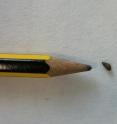Survival without water: A key trait of an aquatic invader to spread
Nowadays, an increasing number of rivers and lakes are being invaded by exotic snails, which come from remote regions, and even other continents. Such species represent a threat to native species, as they compete for food or space with them. This is the case of the mudsnail Potamopyrgus antipodarum. This small aquatic snail is native to New Zealand, and has spread throughout rivers, lakes or streams in Europe, Australia, America and Asia. The invasion success of this mudsnail may be partly due to the ability of females to reproduce without participation of males (i.e. parthenogenesis). This means that only one female is able to start a new population. Besides, the reproductive potential is huge, up to 230 juveniles per female in a year.
But how can these snails disperse from catchment to catchment? If the species were able to tolerate desiccation, it could be transported attached to birds, fishing tools or terrestrial animals. This possibility has been investigated by the Spanish ecologists Álvaro Alonso and Pilar Castro-Díez from the University of Alcalá, whose research was published in the open-access journal NeoBiota.
They performed a laboratory experiment, exposing the snails to different dehydration periods and counting the number of surviving snails. In this way they demonstrated that the mudsnail can survive up to 48 hours out of water. From this finding, two (low-cost) and relatively easy control mechanisms for avoiding the spread of mudsnails emerge: 1) exposing to air of any fishing tools and/or boats for more than 53 hours and 2) avoiding the access of wild and domestic animals to infected rivers or lakes via physical barriers or scarecrows. Such simple measures can actually help to preserve water bodies free of invaders.
Source: Pensoft Publishers
Other sources
- Survival without water: A key trait of an aquatic invader to spreadfrom Science DailyWed, 22 Aug 2012, 21:31:49 UTC
- Survival without water: A key trait of an aquatic invader to spreadfrom PhysorgWed, 22 Aug 2012, 15:30:56 UTC
